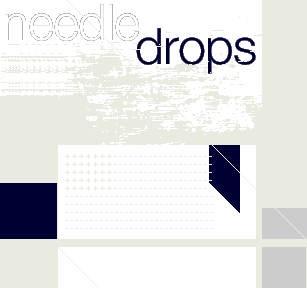


++ Needle Drops is now an occasional music column that a number of Neumu writers take turns writing. All columns prior to March 2004 were written by Philip Sherburne.
++ Recently ++
Tuesday, November 29, 2005 = The Stooges Unearthed (Again)
Tuesday, November 8, 2005 = Documenting Beulah And DCFC
Tuesday, November 1, 2005 = Out-Of-Control Rock 'N' Roll Is Alive And Well
Tuesday, October 25, 2005 = Just In Time For Halloween
Monday, October 3, 2005 = The Dandyesque Raunch Of Louis XI
Monday, August 15, 2005 = The Empire Blues
Tuesday, August 9, 2005 = David Howie's Sónar Diary
Monday, July 25, 2005 = Hot Sounds For Summertime
Monday, June 27, 2005 = Overcoming Writer's Block At Sónar 2005
Monday, June 4, 2005 = Cool New Sounds To Download Or Stream
++ Needle Drops Archives ++
View full list of Needle Drops articles...
|
|
 |
Tuesday, November 8, 2005
++ Documenting Beulah And DCFC
By Jennifer Przybylski
++ Before the title sequence in the Beulah tour documentary "A Good Band Is Easy to Kill," there's this outside-his-apartment interview scene with piqued Beulah frontman Miles Kurosky, who punctuates the film's start with a somewhat defensive "Fuck Bob Dylan." If
you take terrible offense, this makes for something to adhere to the back of
Kurosky's T-shirt. Me, I had already read some fairly divisive stuff about Dylan's
legacy following the PBS broadcast of Scorsese's feature-length bio. Besides,
Kurosky's premise — that you should be critically compared to your own catalog, not somebody else's — is easy to get with.
I'm thinking of that NPR review where Coldplay were revealed to be enervating
and adult up against the fuzz-guitar and upstartness of Dressy Bessy. I may not
agree with the juxtaposition of the subjects; after all, each band gives its
audience something completely different. But the reductive part, that there are
still really good bands out there that very few people hear about, fits in unsurprisingly
well here. Because when I talk about liking both Charles Norris' Beulah film
and "Drive Well, Sleep Carefully," Justin Mitchell's own tour film about Death
Cab for Cutie, chances are you've heard about one band more than the other — even
prior to the release of Transatlanticism and that "OC" appearance.
Anyway, as Norris relates on the back jacket, Beulah called it quits in 2004
after
eight
years, at the end of their tour in support of Yoko, their pared-down
and decidedly more personal final album. Like Death Cab, San Francisco's Beulah — beginning
with two members and tying it off with several more over the course of four records — were
also invited to perform on Nic Harcourt's "Morning Becomes Eclectic." By then
they'd already received many good reviews. Example: "Beulah writes pop songs
that you always knew existed, you just didn't know where to find them."
I saw Beulah, unfortunately only once, when they were touring with Apples in
Stereo for When Your Heartstrings Break. The show was incredible. I was
not surprised to read later in an online interview that during the Beulah writing
process, a request for a baroque piano part would usually return four, and Kurosky
just picked the best one. (This would only be ridiculous if the effort weren't
readily apparent.) When Your Heartstrings Break sold it for me, moving
away from the worn, lo-fi sound of the debut Handsome Western States to
a record that owes as much to film scores as to drenching the somewhat
sad love songs in glorious arrangements of horns, strings and maracas. The
Coast Is Never Clear followed (for the film's title Norris turned the "man" from
track two into "band"), with Free Design-y intros, horns again but different
(I
mean it), and rock guitar.
"A Good Band Is Easy to Kill" includes a montage of all of the fans pulled on
stage to shake it with Beulah when they play "Silver Lining," probably one of
the most fun songs on Coast.
It really doesn't matter that the punk rock girl of the lyrics is more like
a cool shout-out for those shimmying on stage and less of an allusion to getting
older. But the 34-year-old Kurosky addresses the issue at the beginning of the
film, when considering how the scene's attractants — hanging out with young
people, doing young things — can make you feel, well, not that young. Even
if you really don't
feel old. "We're at a weird age, aren't we?" is what he ends up with, before
flagging any talk of the band's demise with an oath of silence.
So while the impending break-up would be a compelling reason for a rock documentary, it doesn't consume the film. Instead there are a few fractious road moments, a lot of unexpurgated road moments, and some great live performances. There are also some sweet payoffs for the band, like when Bill Swan grins about how the front row knew all of the words to every one of the records, or the camaraderie with John Vanderslice, who joins them on tour. And while there is some spleen for indie kids who e-mail the band with critiques of their performance, it's obvious Beulah loved to play and to meet with everyone who came out to the show. "A Good Band Is Easy to Kill" will either dash your heart against a rock or have you pulling out the old records. No, it will do both.
++ "Drive Well, Sleep Carefully," Justin Mitchell's 16mm film, thoughtfully appends to Death Cab's interim report a road diary of personal interviews and live performances (much as he did with Ted Leo and the Pharmacists for his previous film "Dirty Old Town"). His conscious intent — as in "…Town" and his debut "Songs for Cassavetes" — to intelligently document a rise is notable; of course there is the conversation about moving to Atlantic, and what the implications might be, and how secure they feel in their decision to sign with a major at this point in their career. But "Drive Well, Sleep Carefully" does not hang on that moment. After all, the story here is the band and an audience — blurred, in part, by successful side-projects, a producer/member who continues to be very much in demand, and a media landscape that recognizes the ratings appeal of this kind of music. I'm sure the band is even-keel enough to appreciate a place in the running patter of character Seth Cohen alongside mentions of Fantagraphics and Joe Sacco.
As otherworldly as the televised attention may be, it is also flattering. And while it may have contributed to the band's rise, it didn't create it. Death Cab for Cutie's pronounced commonweal — family-like label relations, commitment to their fans as well as each other, and respect for everyone involved in what they are trying to do — deserves the credit.
Interviews with the individual members — Ben Gibbard, Chris Walla, Nick Harmer and Jason McGerr — affirm a sense of humor along with the professionalism. The guys laughingly conspire with the cameraman to make it look like they sink an impossible basketball shot on the first try. They also goof about having tour laminates made for the dates when they are finally at home.
Like Mitchell prior to this film, I have never seen the band live. But, also like him, I have heard great things about the concerts. "Drive Well, Sleep Carefully" decides the argument with excellent live performances, some relevant exposition and the opportunity to see why Death Cab for Cutie remain one of the best bands around.
As much as the music, and more so than the label it's recorded on, I am interested
in what holds importance in the musician's life and whether the resulting conversation
sustains the integrity of their music. It's enlivening to read that Chris Walla
likes pop music as much as he does, that he is as excited about the new Laura
Veirs record as I am. I hope that feeling of community never diminishes. There
really is some very good music out there; we need each other to find it.
|
| |
|